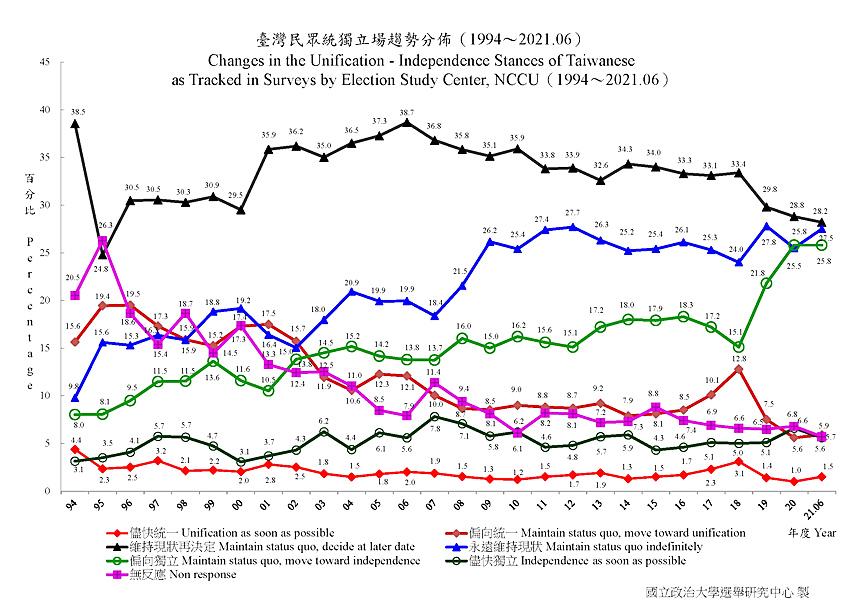Self-identification as “Taiwanese and Chinese,” or solely as “Chinese,” has dropped to record lows, while 63.3 percent of the public regard themselves as Taiwanese, a survey released on Tuesday by National Chengchi University’s Election Study Center showed.
Respondents identifying as Taiwanese and Chinese dropped to 31.4 percent, while those identifying solely as Chinese fell to 2.7 percent, the survey showed.
The results reflect changes in attitudes since 1994 among Taiwanese toward independence and unification with China, as well as self-identification trends since 1992, commenters said.

Screen grab from the Web site of National Chengchi University’s Election Study Center
Support for independence was 25.8 percent, while about 5 percent of respondents said that they want the nation to “declare independence as soon as possible,” the survey showed.
Support for the “status quo” in the Taiwan Strait was 28.2 percent, while 27.5 percent said they would prefer that the “status quo” be permanent, the survey showed.
The results showed that 1.5 percent of respondents want “unification with China as soon as possible,” while 5 percent said that they leaned toward unification.
Democratic Progressive Party (DPP) Legislator Hsu Chih-chieh (許智傑) yesterday said that Chinese oppression of Hong Kong’s democracy and Taipei’s successful efforts to increase interactions with the international community under the name Taiwan contributed to the increase in people who self-identify as Taiwanese.
The Chinese Nationalist Party (KMT) should abandon its outmoded adherence to the so-called “1992 consensus” and dreams of “uniting China,” Hsu said.
The “1992 consensus” — a term that former Mainland Affairs Council chairman Su Chi (蘇起) admitted making up in 2000 — refers to a tacit understanding between the KMT and the Chinese government that both sides acknowledge there is “one China,” with each side having its own interpretation of what “China” means.
The Election Study Center has been conducting polls on the issue of national identification for a long time and its findings should be considered credible, DPP Legislator Chen Ting-fei (陳亭妃) said.
The results show that the oppressive tactics adopted by Beijing — fighter jets circumnavigating Taiwan, oppressing Hong Kong and oppression of Uighurs — not only fail to intimidate Taiwanese, but bolster their belief and self-identification as Taiwanese, Chen said.

The Grand Hotel Taipei on Saturday confirmed that its information system had been illegally accessed and expressed its deepest apologies for the concern it has caused its customers, adding that the issue is being investigated by the Ministry of Justice Investigation Bureau. The hotel said that on Tuesday last week, it had discovered an external illegal intrusion into its information system. An initial digital forensic investigation confirmed that parts of the system had been accessed, it said, adding that the possibility that some customer data were stolen and leaked could not be ruled out. The actual scope and content of the affected data

‘LIKE-MINDED PARTNER’: Tako van Popta said it would be inappropriate to delay signing the deal with Taiwan because of China, adding he would promote the issue Canadian senators have stressed Taiwan’s importance for international trade and expressed enthusiasm for ensuring the Taiwan-Canada trade cooperation framework agreement is implemented this year. Representative to Canada Harry Tseng (曾厚仁) in an interview with the Central News Agency (CNA) said he was increasingly uneasy about Ottawa’s delays in signing the agreement, especially as Ottawa has warmed toward Beijing. There are “no negotiations left. Not only [is it] initialed, we have three versions of the text ready: English, French and Mandarin,” Tseng said. “That tells you how close we are to the final signature.” Tseng said that he hoped Canadian Prime Minister Mark Carney

POSITIVE DEVELOPMENT: Japan and the US are expected to hold in-depth discussions on Taiwan-related issues during the meeting next month, Japanese sources said The holding of a Japan-US leaders’ meeting ahead of US President Donald Trump’s visit to China is positive news for Taiwan, former Japan-Taiwan Exchange Association representative Hiroyasu Izumi said yesterday. After the Liberal Democratic Party’s landslide victory in Japan’s House of Representatives election, Japanese Prime Minister Sanae Takaichi is scheduled to visit the US next month, where she is to meet with Trump ahead of the US president’s planned visit to China from March 31 to April 2 for a meeting with Chinese President Xi Jinping (習近平). Japan and the US are expected to hold in-depth discussions on Taiwan-related issues during the

President William Lai (賴清德) yesterday bestowed one of Taiwan’s highest honors on Saint Vincent and the Grenadines (SVG) Ambassador Andrea Clare Bowman in recognition of her contributions to bilateral ties. “By conferring the Order of Brilliant Star with Grand Cordon on Ambassador Bowman today, I want to sincerely thank her, on behalf of the Taiwanese people, for her outstanding contribution to deepening diplomatic ties between Taiwan and SVG,” Lai said at a ceremony held at the Presidential Office in Taipei. He noted that Bowman became SVG’s first ambassador to Taiwan in 2019 and